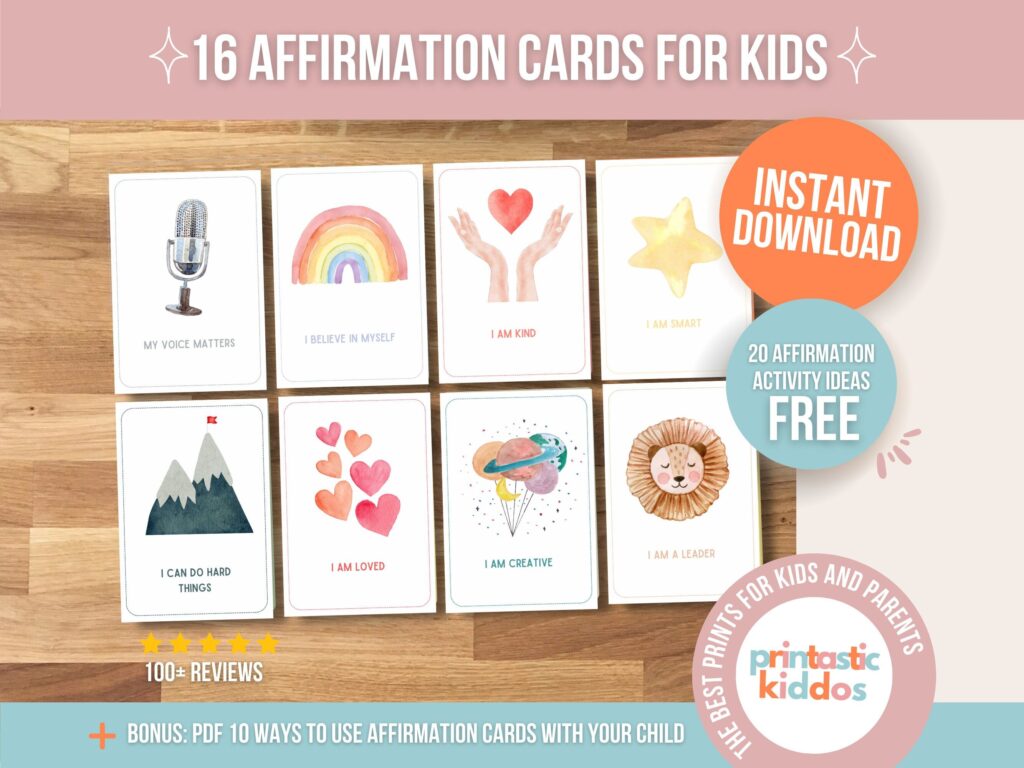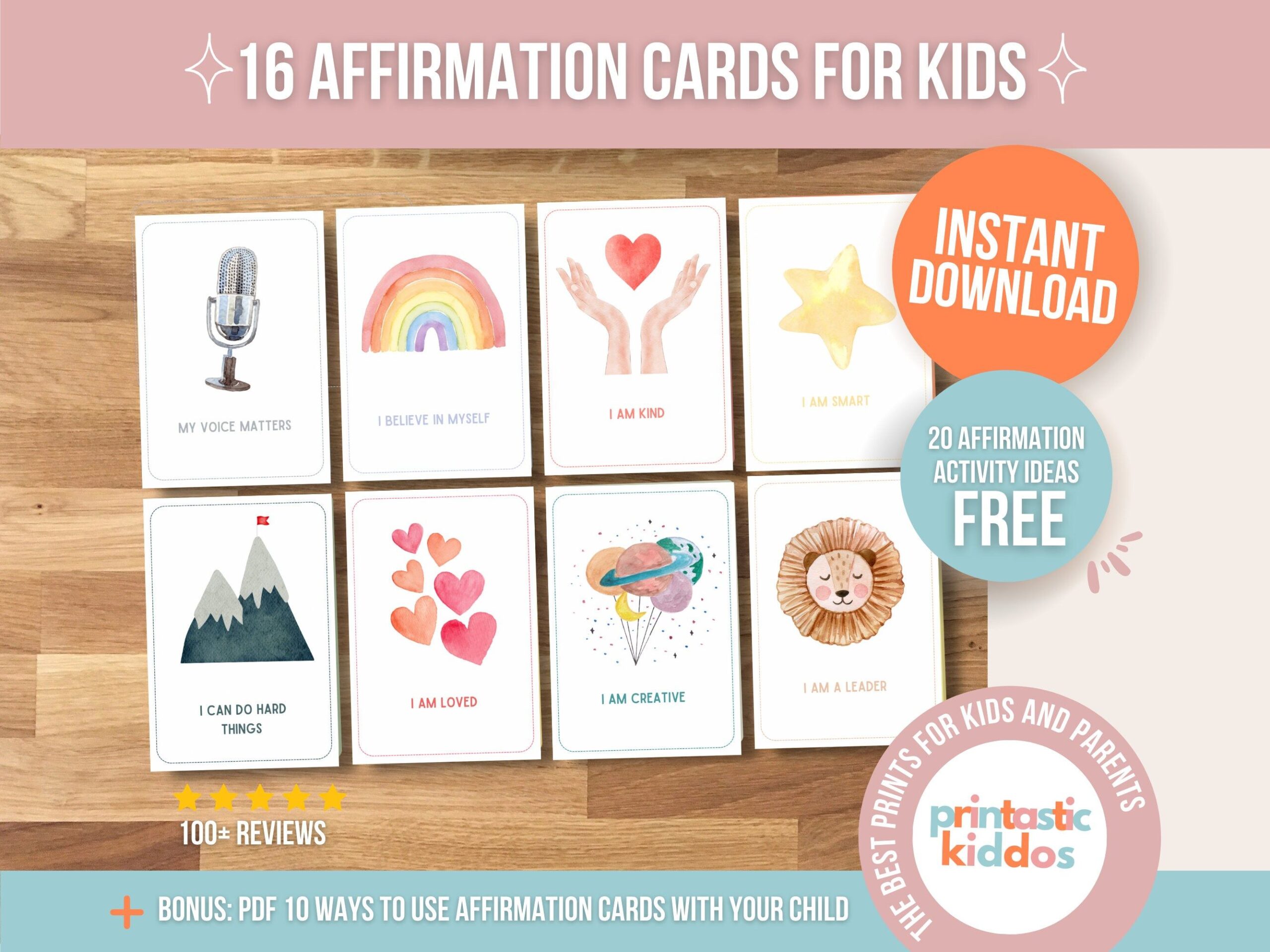
Empowering Young Minds: The Power of Affirmation Words for Kids
In a world that often bombards children with negativity and self-doubt, the simple act of using affirmation words for kids can be a powerful tool for building self-esteem, resilience, and a positive mindset. These carefully chosen phrases, repeated regularly, can help children internalize positive beliefs about themselves, their abilities, and their potential. This article delves into the significance of affirmation words for kids, exploring their benefits, providing examples, and offering guidance on how to effectively incorporate them into a child’s daily life. Understanding and utilizing the power of affirmation words for kids is an investment in their future success and well-being.
Why Affirmation Words Matter for Children
Children are incredibly impressionable, absorbing information and forming beliefs about themselves based on their experiences and the messages they receive. Negative experiences, criticism, or even unintentional offhand remarks can contribute to feelings of inadequacy and low self-worth. Affirmation words for kids act as a counterweight to these negative influences, helping to reshape their internal narrative and foster a sense of self-acceptance and confidence.
The benefits of using affirmation words for kids are numerous:
- Improved Self-Esteem: Affirmations help children recognize their strengths and value, leading to increased self-esteem.
- Reduced Anxiety: By focusing on positive thoughts and beliefs, affirmations can help children manage anxiety and stress.
- Increased Resilience: Affirmations can empower children to bounce back from setbacks and challenges.
- Enhanced Motivation: When children believe in their abilities, they are more likely to be motivated to pursue their goals.
- Positive Mindset: Affirmations help children develop a more optimistic outlook on life.
Examples of Effective Affirmation Words for Kids
The key to effective affirmations is to make them specific, positive, and believable. Here are some examples of affirmation words for kids tailored to different areas of development:
General Self-Esteem
- I am kind and compassionate.
- I am loved and appreciated.
- I am strong and capable.
- I am unique and special.
- I am proud of myself.
- I am doing my best.
- I am a good person.
Academic Performance
- I am a good learner.
- I can learn new things.
- I am smart and capable.
- I am getting better every day.
- I am good at problem-solving.
- I am confident in my abilities.
Social Skills
- I am a good friend.
- I am a good listener.
- I am kind to others.
- I am easy to get along with.
- I am brave and confident.
- I can make new friends.
Emotional Regulation
- I am in control of my emotions.
- I can handle my feelings.
- I am calm and relaxed.
- I am patient and understanding.
- I can express my feelings in a healthy way.
Specific Skills and Talents
- I am a talented artist.
- I am a skilled athlete.
- I am a creative writer.
- I am a great musician.
- I am a natural leader.
- I am good at [specific skill].
How to Incorporate Affirmation Words into a Child’s Daily Life
The most effective way to use affirmation words for kids is to make them a regular part of their routine. Here are some practical tips:
- Morning Routine: Start the day with a few minutes of affirmations. This can set a positive tone for the entire day.
- Bedtime Routine: End the day with affirmations to promote relaxation and positive thoughts before sleep.
- During Challenging Moments: Use affirmations to help children cope with difficult situations or feelings.
- Visual Reminders: Write affirmations on sticky notes and place them in visible locations, such as on the bathroom mirror or in their lunchbox.
- Affirmation Jars: Create a jar filled with affirmations that children can pick from each day.
- Lead by Example: Share your own affirmations with your children. This can help them understand the power of positive self-talk.
- Make it Fun: Turn affirmations into a game or song. This can make them more engaging and memorable.
It’s crucial to tailor the affirmation words for kids to their specific needs and interests. Involve them in the process of creating their own affirmations. This will make them feel more connected to the words and more likely to internalize them. For example, if a child is struggling with math, an affirmation like “I am getting better at math every day” can be more effective than a general affirmation like “I am smart.”
The Importance of Consistency and Patience
It’s important to remember that affirmation words for kids are not a quick fix. It takes time and consistency for children to internalize these positive beliefs. Be patient and supportive, and continue to encourage them to use affirmations even when they don’t see immediate results. Over time, the cumulative effect of these positive messages can be transformative.
Moreover, it’s essential to create a supportive and loving environment where children feel safe to express their feelings and be themselves. Affirmations are most effective when they are used in conjunction with other positive parenting practices, such as providing praise and encouragement, listening to their concerns, and helping them develop healthy coping mechanisms.
Avoiding Potential Pitfalls
While affirmation words for kids are generally beneficial, it’s important to avoid potential pitfalls. One common mistake is to use affirmations that are unrealistic or unbelievable. For example, telling a child who is struggling with reading that they are “the best reader in the world” is likely to be met with skepticism and may even undermine their confidence. Instead, focus on affirmations that are achievable and realistic, such as “I am working hard to improve my reading skills.”
Another potential pitfall is to use affirmations as a way to avoid addressing underlying issues. Affirmations are not a substitute for therapy or professional help when a child is struggling with serious emotional or behavioral problems. In these cases, it’s important to seek professional support to address the root causes of the issues.
The Science Behind Affirmations
While the concept of affirmations may seem somewhat abstract, there is growing scientific evidence to support their effectiveness. Studies have shown that affirmations can activate the reward centers in the brain, leading to feelings of well-being and increased self-esteem. They can also help to reduce stress and anxiety by calming the amygdala, the part of the brain that processes fear and threat.
Furthermore, affirmations can help to reshape neural pathways in the brain. By repeatedly focusing on positive thoughts and beliefs, we can strengthen the neural connections associated with those thoughts and beliefs, making them more accessible and automatic. This process, known as neuroplasticity, is the basis for many forms of therapy and self-improvement.
The power of affirmation words for kids lies in their ability to tap into the brain’s natural capacity for change and growth. By providing children with positive and empowering messages, we can help them develop a strong sense of self-worth, resilience, and optimism.
Conclusion: Investing in a Positive Future with Affirmation Words for Kids
In conclusion, affirmation words for kids are a valuable tool for nurturing their self-esteem, resilience, and positive mindset. By incorporating these empowering phrases into their daily lives, parents, educators, and caregivers can help children develop a strong foundation of self-belief and confidence. Remember to tailor the affirmations to their specific needs, make them a regular part of their routine, and create a supportive environment where they feel loved and appreciated. The investment in using affirmation words for kids is an investment in their future success and well-being. [See also: Positive Parenting Techniques] [See also: Building Self-Esteem in Children] [See also: Managing Anxiety in Kids]

